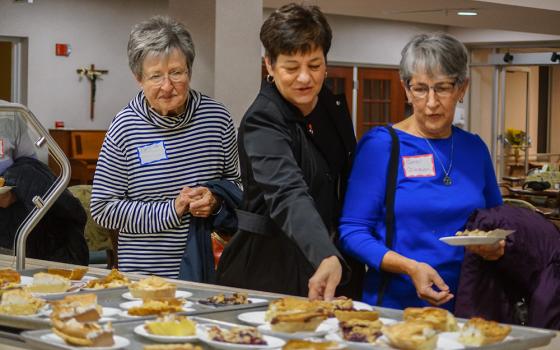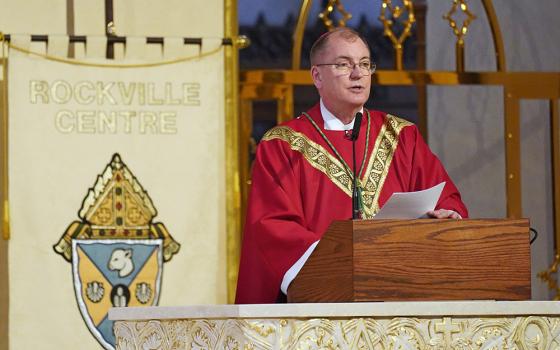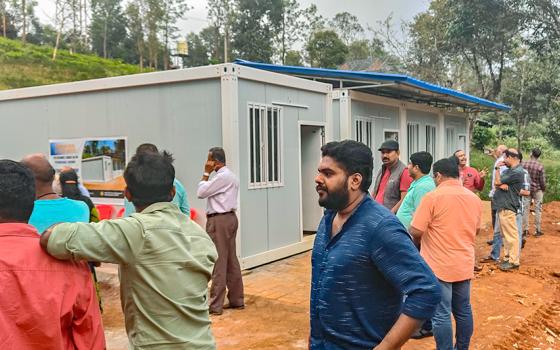Bil'in, Israeli Occupied West Bank
The Catholic Worker Peace team joined the villagers of Bil'in, a village in the Israeli Occupied West Bank, at their weekly demonstration against the barrier wall (an electrified fence, barbed wire, and a military road), which deprives their community of 60 percent of its agricultural land.
At about 1 PM, demonstrators began to descend the hill road toward the barrier with many Palestinians as well as with international supporters from Germany, France, Spain, Canada, the United States, New Zealand, and Israel.
The demonstration was infused with the anger and grief because of the recent killing of one of Bil'in's residents, Bassem Ibrahim Abu Rahme, a 31 year old man who was shot at at close range by an Israeli soldier at a recent Friday demonstration. Bassem had been a nonviolent leader in the community and of the weekly demonstrations.
The crowd moved as a determined group, singing songs and carrying posters and banners. One young Palestinian boy flew a kite designed to represent the Palestinian flag.
Three minutes into the demonstration, the Israeli soldiers, stationed at different positions on the other side of the wall, fired a dozen tear gas canisters into the crowd. Some people began to disperse as additional tear gas cannisters were fired. An ambulance from the Palestinian Red Crescent Society approached the spot from which men and women were running. Medical workers treated people affected by the tear gas, including Eyad Bournat, head of the Popular Committee for Resistance in Bil'in, who also sustained an injury to one eye.
Members of the Catholic Worker Peace Team continued holding their banner, which reads, "No Closure, Rockets, Occupation," along with the image of a dove and the word "Peace" written in Hebrew, Arabic, and English. A jubilant cry sounded from the group of observers at the top of the hill as they witnesses two members of the team holding their positions.
By 2 PM, tear gas cannisters were fired in repeated volleys from both Israeli positions, creating a canopy of blue smoke. An observer from Jaffa, Israel, translated the announcement from the Israeli megaphone, "This is a restricted military area. Do not move closer to the wall!"
As the peaceful demonstration wound down, Palestinian youth began to throw rocks toward and over the barrier wall. The final shots of tear gas canisters ignited the dry grass in a nearby olive grove.
Altogether, more than 100 tear gas canisters were fired and one teenage boy was shot with a rubber coated steel bullet. Five of the Peace Team members inhaled tear gas. Palestinian Medical Relief Team workers offered them gauze soaked in alcohol to ease their discomfort.
After the demonstration, team members spoke with a former Israeli soldier who had joined the protest. He said, "As an Israeli, I was brought up on Zionism, nationalism, and religion, which left me very right wing by the time I joined the army at 18. I wish I could say that I felt bad about tear gassing and shooting Palestinians, but I did not. We thought it was fun. The army dehumanizes people. Palestinians are just objects to these soldiers shooting today. Soldiers have no idea what they are doing. But after a while in the Occupied Territories, I began to ask questions. Over time, with study, I came to oppose the Occupation."
Eyad Bournat invited the team members to meet the family of Bassem Ibrahim Abu Rahme. During and after that meeting, he told the team about the four years of nonviolent protests against the wall, protests which included marches with kites and one with mirrors with horizontal stripes of black tape on them with which they challenged the Israeli soldiers to imaginae what it would be like to be confined behind the bars of a wall. He also told the team that he met with Jewish settlers, and asked them why they chose to live on land seized from Bil'in. He said the settlers replied, "Because it's cheap. We get a luxury apartment for $70,000 which we have to pay within 99 years."
When asked what would bring peace, Bournat said, "When the Occupation is finished. When we have freedom and justice. We need the help of people all over the world who believe in peace and freedom." He suggested demonstrations in the United States along with a boycott of Israeli goods. Bournat concluded, "Many Israeli friends come here to demonstrate against the wall. We can live together in peace. We are against a wall, but if Israelis feel they need a wall for security, let them build it on their land instead of in Bil'in which is 5 km from the Israeli border. Please tell all the people in America that we are strong here and will stay on our land."
Members of the Peace Team plan to meet tomorrow in Jerusalem with a representative of the Israeli Committee Against House Demolitions. They will receive a tour of recently demolished homes of Palestinian citizens of Israel. Palestinians consider these demolitions a part of an Israeli campaign to increase the Jewish majority in Jerusalem. Afterwards, the team will travel to Sderot, the Israeli city which has suffered the largest number of rocket attacks from the Gaza Strip. They will return to the United States on Sunday.



